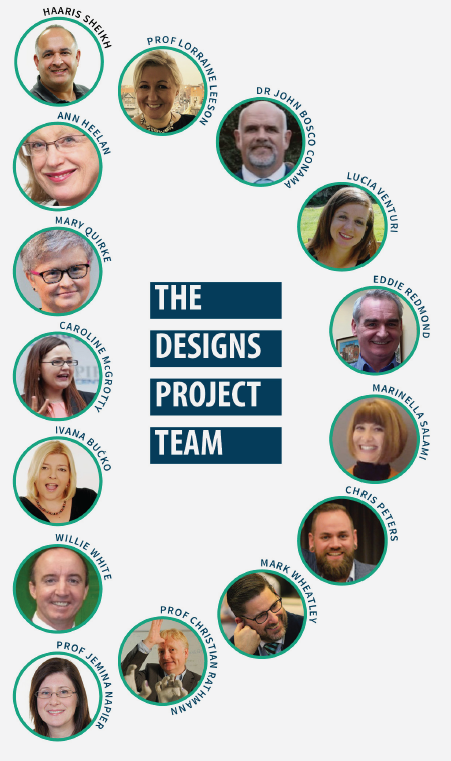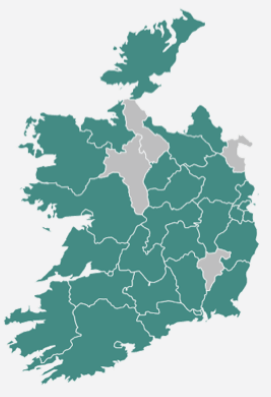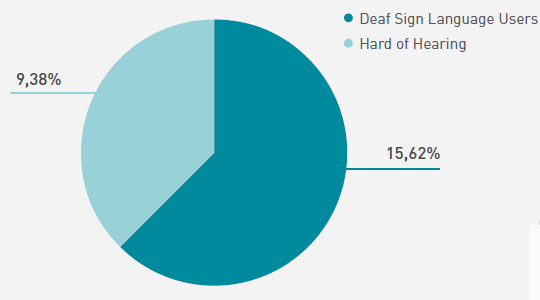DESIGNS - Improving employment opportunities for sign language users in the EU

AHEAD are one of seven partners working together in an Erasmus+ project entitled DESIGNS (Deaf Employment for Sign Language Users in the EU). The overall aim of the project is to create Vocation Educational Training (VET) and Continuous Professional Development (CPD) training resources and exchange best practices across Europe to facilitate greater participation of Deaf sign language users in employment. (Deaf with a capital D is used in this article to represent those who are Deaf and use sign language as their language and their preferred means of communication.) DESIGNS aims to develop an innovative training programme and guides for key social actors to support the employment of Deaf people in skilled jobs, to offer career progression and promote upward mobility. The project aims to reach out to:
- Employers – this ranges from all human resource professionals, large enterprises and small to medium size enterprises (SMEs), employer bodies, career and placement personnel as well as access and disability professionals in higher education.
- Sign Language Interpreters - those who support Deaf students in education, transitioning from education to employment and those who interpret at all aspects of recruitment and participation in Deaf employment.
- The Deaf Community – students in higher education and graduates transitioning from education to employment but also those deaf people who are unemployed and actively seeking work.

DESIGNS brings together experts in the fields of employment, sign language training and Deaf studies to tackle universal problems and propose some tried and tested solutions which can be replicated across many countries. The consortium comprises 7 leading organisations from 4 countries;
- Ireland
- Interesource Group (Ireland) Limited
- Trinity College Dublin (TCD)
- Association for Higher Education Access & Disability (AHEAD)
- Belgium
- European Forum for Sign Language Interpreters (EFSLI)
- European Union of the Deaf (EUD)
- Germany
- University of Hamburg
- United Kingdom
- Heriot-Watt University
The project is due to be completed by May 2019.
Why the DESIGNS project has been established
There is a direct link between early education, attainment of professional and/or educational qualifications and advancement into the labour market and social inclusion. Apart from financial autonomy, work and paid employment serves to develop a sense of belonging with positive mental health benefits and identification with the wider community (National Disability Authority, 2005). However, Deaf people in Ireland, as well as throughout the world, continue to face barriers in education, employment and access to services such as healthcare, legal and social welfare settings. In a report on poverty in the Deaf community, Conama and Grehan (2001) stated that Deaf people experience higher rates of poverty, social exclusion and unemployment. Factors such as leaving school with no examination results or qualifications and inadequate support for Irish Sign Language has resulted in far poorer outcomes for Deaf adults with 80% having literacy problems compared to 25% of the population as a whole (Irish Deaf Society, 2007). Research and data on unemployment is under reported and inaccurate. ‘Deafness and hearing loss’ is often used to report data, and sign language users who are Deaf are under-researched. The World Federation of the Deaf (WFD) also reports that figures on (un)employment are inaccurate and difficult to quantify (Hauland, H. and Allen C., 2009).
WAM’s Experience of Placing Deaf Graduates
AHEAD, more specifically, The WAM Programme, were asked to be a partner in this project as we can offer valuable information and knowledge. This has been gained through supporting employers who have recruited graduates with disabilities through paid, mentored work placements under the WAM Programme. In addition to this, AHEAD also works closely with the higher education sector which includes all access and disability staff, careers and placement officers, faculty staff and funding bodies and other working groups such as DAWN (Disability Advisors Working Network).
WAM has successfully placed over 350 graduates with disabilities in work placements with both the private and public sector in the last 12 years.

In the last 12 years, 7% of those who were placed were Deaf / Hard of Hearing. This is two and half times higher than the current higher education participation rate of Deaf / Hard of Hearing students which is 2.8% (AHEAD, 2017).
Breaking down the 7% into two separate cohorts; 38% were Hard of Hearing and 62% were those who identified as being Deaf and used Irish Sign Language as their primary language.
| Deaf Sign Language Users | 15.62% |
|---|---|
| Hard of Hearing | 9.38% |

On the surface this may appear to be a very positive statistic. However, if we delve further into why Deaf graduates account for almost two-thirds of this cohort we suggest that it is because WAM offers unique opportunities for Deaf graduates, leading to more positive outcomes. We know at WAM, from speaking and working with Deaf graduates looking for employment opportunities, that many struggle to get past the interview stage and some did not receive any alternative formats when requested to undergo a preliminary phone screening before getting to the face to face interview.
When a graduate applies to the WAM Programme for a placement, the employer is made aware in advance of any interview accommodations a person may require. In the last two years, WAM received almost 800 applications from graduates with disabilities for WAM placements; 22% requested some form of accommodation at interview; 12% of these were requests for an Irish Sign Language interpreter at the interview. Often when an employer is made aware of requests for an ISL interpreter the employer asks for assistance with booking an ISL interpreter as they simply don’t know how to go about it. WAM assists the employer with this and provides training around using an ISL interpreter at interview, highlighting the need for a qualified ISL interpreter who is suitable for the graduate. When a Deaf graduate is placed, a full and comprehensive needs assessment is carried out with the graduate as well as training for the employer and the team the Deaf graduate will be working with, if needed.
Get Involved in DESIGNS
Participating in the DESIGNS project is something that AHEAD are very excited about doing as there are a number of outputs which we hope will enhance and create awareness of Deaf employment. Various focus groups with the Deaf community, interpreters and employers will be taking place to produce a research report; training guides for employers will be developed, including a web based app on Deaf awareness.
If you wish to participate and follow the project, visit the website – www.designsproject.eu and be sure to subscribe to the social media sites
References
AHEAD (2017). Numbers of Students with Disabilities Studying in Higher Education in Ireland 2015/16. Dublin: AHEAD Educational Press.
Conama, J. B., & Grehan, C. (2002). Is there poverty in the Deaf Community? Report on the interviews of randomly selected members of the Deaf Community in Dublin to determine the extent of poverty within the Community. Dublin: Irish Deaf Society.
Hauland, H. & Allen, C. (2009). Deaf people and human rights. Helsinki: World Federation of the Deaf.
National Disability Authority (2005). Annual Report 2005. Dublin: National Disability Authority.
